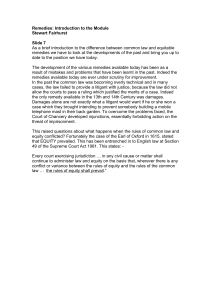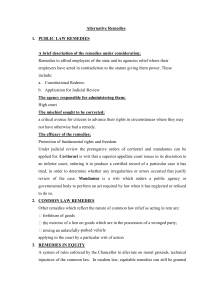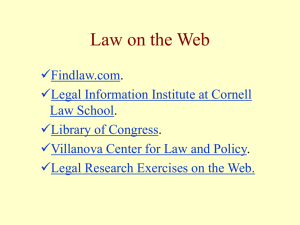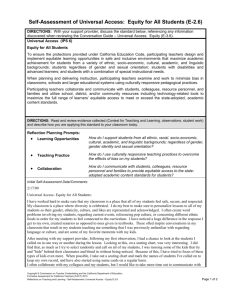Equity Today – Discuss the Characteristics
advertisement
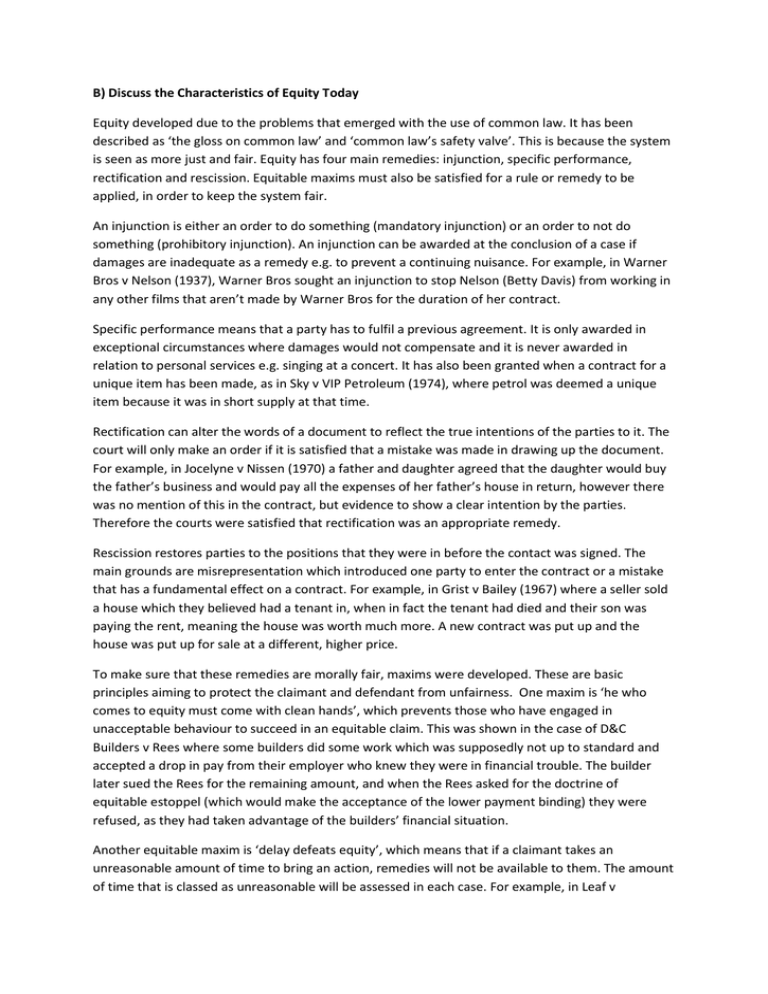
B) Discuss the Characteristics of Equity Today Equity developed due to the problems that emerged with the use of common law. It has been described as ‘the gloss on common law’ and ‘common law’s safety valve’. This is because the system is seen as more just and fair. Equity has four main remedies: injunction, specific performance, rectification and rescission. Equitable maxims must also be satisfied for a rule or remedy to be applied, in order to keep the system fair. An injunction is either an order to do something (mandatory injunction) or an order to not do something (prohibitory injunction). An injunction can be awarded at the conclusion of a case if damages are inadequate as a remedy e.g. to prevent a continuing nuisance. For example, in Warner Bros v Nelson (1937), Warner Bros sought an injunction to stop Nelson (Betty Davis) from working in any other films that aren’t made by Warner Bros for the duration of her contract. Specific performance means that a party has to fulfil a previous agreement. It is only awarded in exceptional circumstances where damages would not compensate and it is never awarded in relation to personal services e.g. singing at a concert. It has also been granted when a contract for a unique item has been made, as in Sky v VIP Petroleum (1974), where petrol was deemed a unique item because it was in short supply at that time. Rectification can alter the words of a document to reflect the true intentions of the parties to it. The court will only make an order if it is satisfied that a mistake was made in drawing up the document. For example, in Jocelyne v Nissen (1970) a father and daughter agreed that the daughter would buy the father’s business and would pay all the expenses of her father’s house in return, however there was no mention of this in the contract, but evidence to show a clear intention by the parties. Therefore the courts were satisfied that rectification was an appropriate remedy. Rescission restores parties to the positions that they were in before the contact was signed. The main grounds are misrepresentation which introduced one party to enter the contract or a mistake that has a fundamental effect on a contract. For example, in Grist v Bailey (1967) where a seller sold a house which they believed had a tenant in, when in fact the tenant had died and their son was paying the rent, meaning the house was worth much more. A new contract was put up and the house was put up for sale at a different, higher price. To make sure that these remedies are morally fair, maxims were developed. These are basic principles aiming to protect the claimant and defendant from unfairness. One maxim is ‘he who comes to equity must come with clean hands’, which prevents those who have engaged in unacceptable behaviour to succeed in an equitable claim. This was shown in the case of D&C Builders v Rees where some builders did some work which was supposedly not up to standard and accepted a drop in pay from their employer who knew they were in financial trouble. The builder later sued the Rees for the remaining amount, and when the Rees asked for the doctrine of equitable estoppel (which would make the acceptance of the lower payment binding) they were refused, as they had taken advantage of the builders’ financial situation. Another equitable maxim is ‘delay defeats equity’, which means that if a claimant takes an unreasonable amount of time to bring an action, remedies will not be available to them. The amount of time that is classed as unreasonable will be assessed in each case. For example, in Leaf v International Galleries (1950), the claimant bought a painting described as genuine and found out five years later that it wasn’t. They tried to claim the equitable remedy of rescission, but the delay had been too long. Equity has shown that in can develop along with current times, by making new rules such as promissory estoppel, which is an act that can stop a party to a contract enforcing their legal rights when they have given their word that they won’t. Illustrated in the High Trees housing case (1947) where a landlord agreed to lower rent during WW2 due to economic difficulties, and then tried to enforce the original contract after the war to collect the difference between the rent collected and the rent which was originally agreed on. Lord Denning stated that parties must comply with the promise they had made, so the rent was put back up but the rent from the previous 5 years didn’t have to be paid. Equity has been proven to be exceptionally flexible in meeting new challenges to the legal system and acting as a reform mechanism. As society saw an increase in divorces, women who had no legal interest in the family home would have been left unprotected had the courts not recognised that women had an equitable interest in the family home and could not have been evicted until Parliament had the opportunity to pass appropriate legislation in the Matrimonial Homes Act 1967. There were further developments of new remedies in the form of Mareva Injunctions (where the courts can freeze the assets of a party to prevent removal of finances from the jurisdiction) and Anton Piller orders (where the court can order a search of premises and the seizures of documents and items). Equity therefore provides a supplement to common law, ensuring that practical remedies where common law is insufficient.
